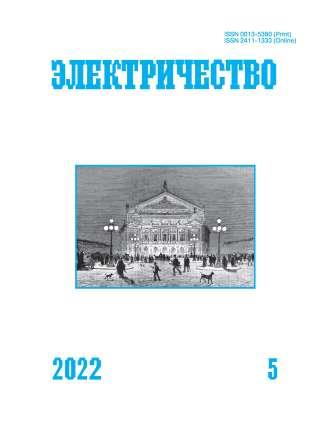Transformations of Higher Electrical Engineering Education in Russia. Digitalization of Education
DOI:
https://doi.org/10.24160/0013-5380-2022-5-4-9Keywords:
higher electrical engineering education, transformation, digitalizationAbstract
The reasons, mechanisms and consequences of transformations of higher electrical engineering education in Russia are considered. The transformations are analyzed in socio-historical and economic aspects. Extensive mechanisms of higher education transformations connected with a growing number of students and higher schools, and with the fact that new classes and strata of the society are involved in education are considered along with intensive mechanisms related to reformatting the education system itself: joining the Bologna Process or commencing the education digitalization process. The effect the economic factors have on the transformation of education under the conditions of increasing the expenditures for it (during the Nicholas and Stalin rises) and reducing them in the 1990s is pointed out. The bureaucratization and its influence on the electrical education environment are specially noted. The transformations of education in the 21st century and, above all, its digitalization are subjected to a special analysis. The US practices of analyzing higher education are given. It is concluded that the transformations of higher education are natural stages and mechanisms of its development.
References
2. Бутырин П.А. Социокультурные пространства инновационного развития электротехники России. –Электричество, 2011, № 1, с. 2–10.
3. Шателен М.А. Преподавание электротехники в высших технических заведениях в России и за границей. – Электричество, 1898, № 2, с. 17–20; № 4-5, с. 49–52; № 7, с. 97–105; № 11-12, с. 153–159.
4. Шателен М.А. Из "Анкеты инженеров-электриков, окончивших Санкт-Петербургский политехнический институт императора Петра Великого". – Электричество, 1914, № 5, с. 133–142.
5. Лодыгин А.Н. Техническое образование и идеалы американских инженеров. – Электричество, 1909, № 2, с. 80 – 85.
6. Курбатов С.И. Задачи высшего электротехнического образования в СССР. – Электричество, 1926, № 4, с. 202–207.
7. Голубцова В.А. Вопросы подготовки инженерных кадров для энергетики. – Электричество, 1946, № 4, с. 3–6.
8. Андреев А.Л. Российское образование. Социально-исторические контексты. М.: Наука, 2008, 359 с.
9. Болонская декларация: Европейское пространство высшего образования: Совместное заявление европейских министров образования, подписанное в Болонье 19 июня 1999 года. – Вестник Российского философского общества, 2005, № 1 (33), с. 74–77.
10. Приказ Минобрнауки России № 40 от 15 февраля 2005 г. «О реализации положений Болонской декларации в системе высшего профессионального образования Российской Федерации».
11. Образование и общество: Готова ли Россия инвестировать в будущее? Доклад Общественной палаты Российской Федерации. М.: 2007, 102 с. [Электрон. ресурс], URL: htps://gtmarket.ru/files/news/1523/Education_and_Society_Russia_2007.pdf (дата обращения 28.03.2022).
12. Леонов Ю.Г. Венец эволюции, или чиновники России. – Вестник РАН, 1912, т. 82, № 9, с. 833–845.
13. Протасов В.Н. Иррациональные методы властвования как инструмент самосохранения и экспансии бюрократически организованных систем управления. – Государство и право, 2017, № 10, с. 55–61.
14. Голик Ю.В. Бюрократизация науки недопустима. – Государство и право, 2021, № 12, с. 67–72.
15. Иностранные хищные журналы в Scopus и WoS: переводной плагиат и российские недобросовестные авторы. М: 2020, 64 с. [Электрон. ресурс], URL: https://kpfran.ru/wp-content/uploads/plagiarism-by-translation-2.pdf (дата обращения 28.03.2022).
16. Минина В.Н. Цифровизация высшего образования и её социальные последствия. – Вестник Санкт-Петербургского университета. Социология, 2020, т. 13, вып. 1, c. 84–101.
17. Буланова М.Б., Великая Н.М. Цифровизация образования в период пандемии: преимущества и риски. – Университетское управление: практика и анализ, 2021, 25 (4), с. 25–36.
18. Карпов А.О. Работник знаний в генезисе социально-экономической концепции общества знаний. – Вопросы философии, 2016, №8, с. 57–68.
19. Хомский Н. Образование: кому и зачем? [Электрон. ресурс], URL: https://zm-sochi.livejournal.com/1348042.html (дата обращения 28.03.2022).
#
1. Butyrin P.А. Elektrichestvo – in Russ. (Electricity), 2009, No. 8, pp. 6–11.
2. Butyrin P.А. Elektrichestvo – in Russ. (Electricity), 2011, No. 1, pp. 2–10.
3. Shatelen М.А. Elektrichestvo – in Russ. (Electricity), 1898, № 2, pp. 17–20; No. 4-5, pp. 49–52; No. 7, pp. 97–105; No. 11-12, pp. 153–159.
4. Shatelen М.А. Elektrichestvo – in Russ. (Electricity), 1914, No. 5, pp. 133–142.
5. Lodygin А.N. Elektrichestvo – in Russ. (Electricity), 1909, No. 2, pp. 80–85.
6. Кurbаtоv S.I. Elektrichestvo – in Russ. (Electricity), 1926, No. 4, pp. 202–207.
7. Golubtsova V.А. Elektrichestvo – in Russ. (Electricity), 1946, No. 4, pp. 3–6.
8. Andreev А.L. Rossiyskoe obrazovanie. Sotsial'no-istoricheskie konteksty (Russian Education. Socio-Historical Contexts). М.: Nauka, 2008, 359 p.
9. Vestnik Rossiyskogo filosofskogo obshchestva – in Russ. (Bulletin of the Russian Philosophical Society), 2005, No. 1 (33), pp. 74–77.
10. Prikaz Minobrnauki Rossii № 40 ot 15 fevralya 2005 g. «O realizatsii polozheniy Bolonskoy deklaratsii v sisteme vysshego professional'nogo obrazovaniya Rossiyskoy Federatsii» (Order of the Ministry of Education and Science of the Russian Federation No. 40 dated February 15, 2005 "On the implementation of the provisions of the Bologna Declaration in the system of higher professional education of the Russian Federation").
11. Obrazovanie i obshchestvo: Gotova li Rossiya investirovat' v budushchee? Doklad Obshchestvennoy palaty Rossiyskoy Federatsii (Education and Society: Is Russia Ready to Invest in the Future? Report of the Public Chamber of the Russian Federation). М.: 2007, 102 с. [Electron. resource], URL: htps://gtmarket.ru/files/news/1523/Education_and_Society_Russia_2007.pdf (Date of appeal 28.03.2022).
12. Leonov Yu.G. Vestnik RAN – in Russ. (Bulletin of the Russian Academy of Sciences), 1912, vol. 82, No. 9, pp. 833–845.
13. Protasov V.N. Gosudarstvo i pravo – in Russ. (State and Law), 2017, No. 10, pp. 55–61.
14. Golik Yu.V. Gosudarstvo i pravo – in Russ. (State and Law), 2021, No. 12, pp. 67–72.
15. Inostrannye hishchnye zhurnaly v Scopus i WoS: perevodnoy plagiat i rossiyskie nedobrosovestnye avtory (Foreign Predatory Magazines in Scopus and WoS: Translated Plagiarism and Russian Unscrupulous Authors). М: 2020, 64 p. [Electron. resource], URL: https://kpfran.ru/wp-content/uploads/plagiarism-by-translation-2.pdf (Date of appeal 28.03.2022).
16. Minina V.N. Vestnik Sankt-Peterburgskogo universiteta. Sotsio-logiya – in Russ. (Bulletin of St. Petersburg University. Sociology), 2020, vol. 13, iss. 1, pp. 84–101.
17. Bulanova M.B., Velikaya N.М. Universitetskoe upravlenie: praktika i analiz – in Russ. (University Management: Practice and Analysis), 2021, 25 (4), pp. 25–36.
18. Karpov А.О. Voprosy filosofii – in Russ. (Questions of Philosophy), 2016, No. 8, pp. 57–68.
19. Homskiy N. Obrazovanie: komu i zachem? (Education: to Whom and Why?) [Electron. resource], URL: https://zm-sochi.livejournal.com/1348042.html (Date of appeal 28.03.2022)




